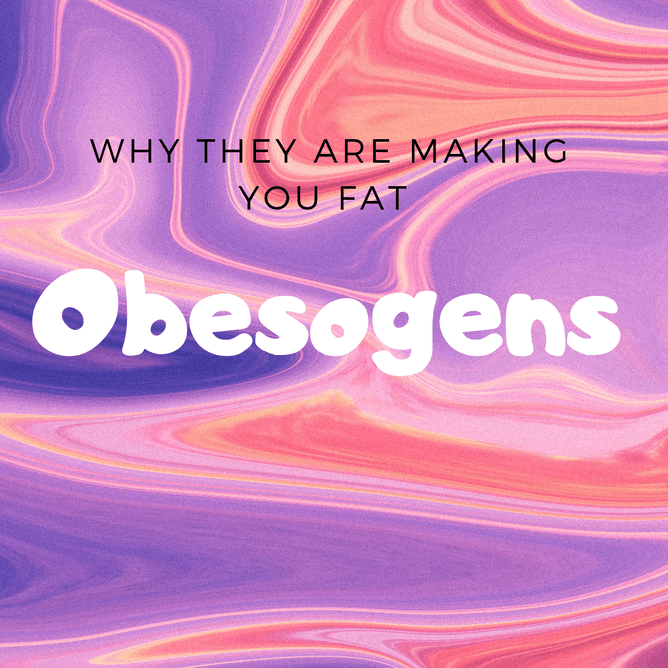OBESOGENS AND HOW THEY AFFECT YOUR BODY
This blog is about a little known term called "Obesogens". What are obesogens you might ask and ooh they sound nasty. Well they are. Read on to find out if you are affected by obesogens.
From a definition standpoint Obesogens are anything that promotes obesity.
Possible obesogenic factors include excessive food intake, lack of exercise, insufficient sleep, antipsychotic drugs, late pregnancy and some environmental pollutants but in this blog I wanted to concentrate on just the environmental pollutants that are Obesogenic and discuss ways you can mitigate your risk and exposure to them and where to go if you think your weight problems are partly due to the effects of these pollutants.
Obesogens can work in one of many ways, for example:- Obesogens make more and bigger fat cells that are more efficient at storing calories and not so efficient at burning calories.
- Obesogens can affect your the control of appetite and satiety. It can make you resistant to the satiety hormone Leptin.
- Obesogens can affect your resting metabolic rate therefore lowering the amount of calories you expend every day which can massively impact your weight
Many people can attest to the fact that the old calories in vs calories equation of weigh tloss just isn't working and that it's far more complicated than that.
Of course eating according to how many calories you expend is an important part of the puzzle but it isn't all of the equation.
This fact really hit home for me when I was running through NZ for charity, doing up to 500km a week and I actually put on weight and fat weight at that. It was then I started delving into the deeper underlying issues around stubborn weight loss and there are many many aspects to it but let me stick here to the Obesogen factor.
Many factors affect our ability to lose fat things like the type of calories ingested not just the amount, when they ingested, our hormone household and how balanced that is, the amount of cortisol and adrenaline in our blood stream and the effects that has, the types of exercise we do and even the times we eat and the times we exercise all effect our ability to lose weight.
Then there are things like the state of the gut microbiome and whether your fat cells themselves are functioning properly and in this instance whether due to exposure to obesogenic environmental pollutants they have turned "nasty" or dysfunctional meaning the actual cells grow larger and store the pollutants and are less able to release their fat due to these pollutants even in the face of a calorie deficit and that the fat cells are less able to respond to life styles changes.
Obesogens can disrupt our hormonal systems, alter how we create and store fat, and change how we respond to dietary choices
Then there is your base metabolic rate and whether you have thyroid issues or adrenal gland issues which can also be affected by obesogens.
It's known for example that on average women going through menopause put on an average of between 3 and 10 kg and that's without changing anything, the dreaded middle age spread, add to that things like declining muscle mass and the aches and pains often associated with getting older making you less likely to move and leading to more sitting etc and you have a perfect storm
Even extreme dieting and ongoing reduced caloric intake can have a massive and ongoing impact on your base metabolic rate and your thyroid hormones so how in the hell can we lose weight effectively and more to the point of this article what are Obesogens and how can we avoid them.
There are many known obesogenic substances or weight inducing chemicals that we are exposed to on a daily basis here are some of them, but it's by no means an exhaustive list (there are currently 50 chemicals on this list but this is growing) but the scary thing is these are chemicals that we are exposed to on a daily basis in our own homes, though our food supply, though the personal hygiene products we use and more:
- Phthalates,
- Tributyl 10,
- Bisphenols A, S and F,
- Dihexyl phthalateflame retardants (in all our furniture for example and many other places,
- Parabens,
- perfluorinated chemicals (pfcs),
- stain repellant coatings, non stick cookware
- even some foods like Fructose and MSG.
It has been shown in studies that If you have a lot of these chemicals in your blood you gain weight the fastest and have the lowest resting metabolic rates.
These can affect the function of the thyroid hormone receptor which will affect the resting metabolic rate and that means you have to eat less or gain fat.
If you want to explore more about Obesogens and how you can avoid as much as possible your and your family's exposure to these chemicals then there is a great book out by Dr Bruce Blumberg called "The Obesogen Effect" where he describes where obesogens are found and offers practical solutions for reducing exposure. Dr Blumberg is the Professor of Developmental and cell Biology and Professor of Pharmaceutical Sciences at the University of California.
You can find the book and more info at https://theobesogeneffect.com/
You can also listen to Dr Lindsey Berkson and Dr Blumberg on their podcast at
https://podcasts.google.com/?f...
There are also a number of apps out there that you can. One example is Think Dirty Shop Clean which tells you what the ingredients in your beauty, personal care and household products are. Just scan the product barcode and Think Dirty will give you easy-to-understand info on the product, its ingredients, and shop cleaner options!
So maybe it isn't all your fault and perhaps there is more to this weight loss thing than meets the eye and find out what you can do to help yourself.
